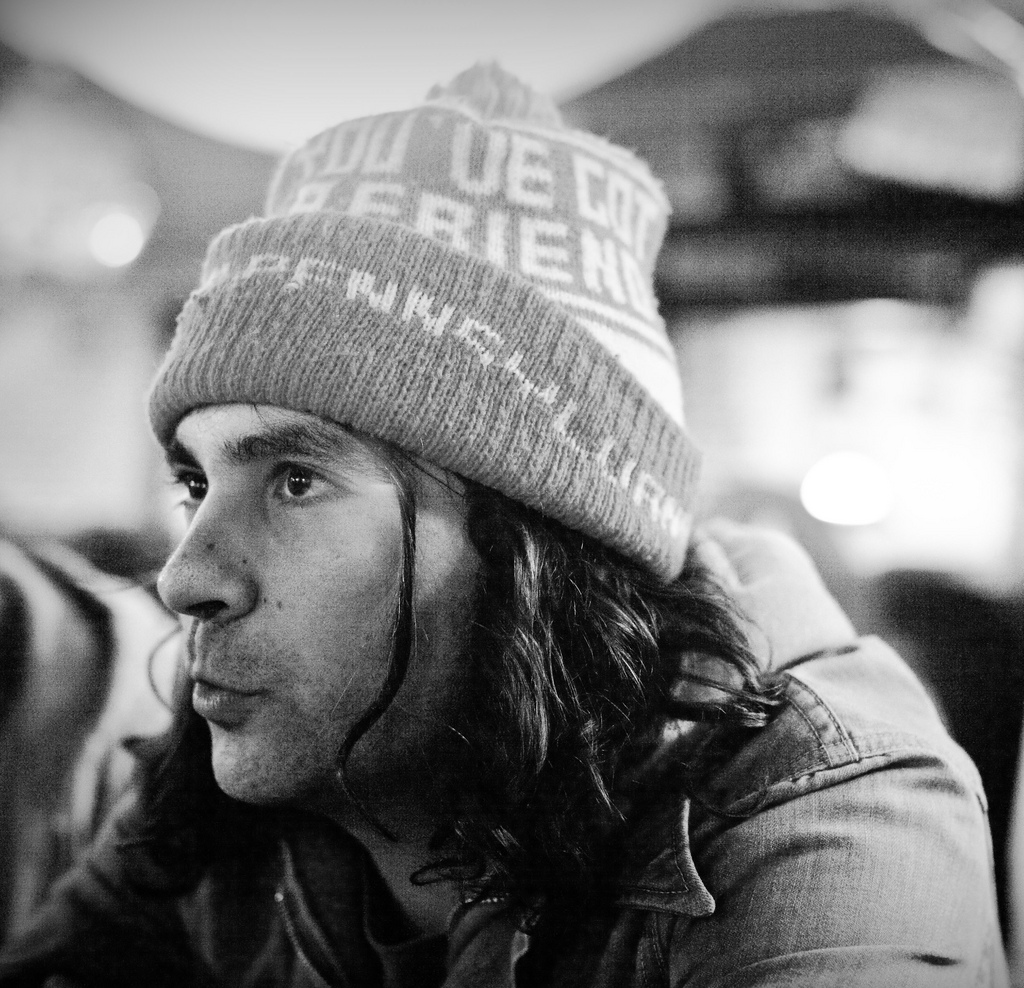
[Photography by GRAHAM TOLBERT]
![]() BY MEREDITH KLEIBER You’ll be hard pressed to find a harder-working musician in Philadelphia than Adam Granduciel. When he’s not on tour with his own band, Philly’s own The War On Drugs, he’s either touring with The Violators, the band of close friend (and Drugs founding member) Kurt Vile, or completely engrossed in finessing experimental recordings in his Fishtown home studio. The War On Drugs’ new album, Slave Ambient, is essentially the product of those intense home-studio recording sessions, enhanced by Granduciel’s astute songwriting and the commanding synergy of the band. I caught up with Adam by phone on his day off from the recent west-coast leg of The Violators’ tour and we chatted about the new album, touring, and the laziness of modern journalism.
BY MEREDITH KLEIBER You’ll be hard pressed to find a harder-working musician in Philadelphia than Adam Granduciel. When he’s not on tour with his own band, Philly’s own The War On Drugs, he’s either touring with The Violators, the band of close friend (and Drugs founding member) Kurt Vile, or completely engrossed in finessing experimental recordings in his Fishtown home studio. The War On Drugs’ new album, Slave Ambient, is essentially the product of those intense home-studio recording sessions, enhanced by Granduciel’s astute songwriting and the commanding synergy of the band. I caught up with Adam by phone on his day off from the recent west-coast leg of The Violators’ tour and we chatted about the new album, touring, and the laziness of modern journalism.
PHAWKER: Let’s start with where it all began. How old were you when you realized that you had real musical talent?
ADAM GRANDUCIEL: My friend’s dad played electric guitar, and I went over there one day when I was about 13 I’m guessing, and I played his electric guitar and thought it was the coolest fuckin’ thing I’d ever done in my whole life. Then my dad bought me an electric. I’ve loved music since I was 8 or 9, even though it was mostly pop. Then I started to write when I was about 17.
PHAWKER: So did you form any bands back then, or was it mostly by yourself?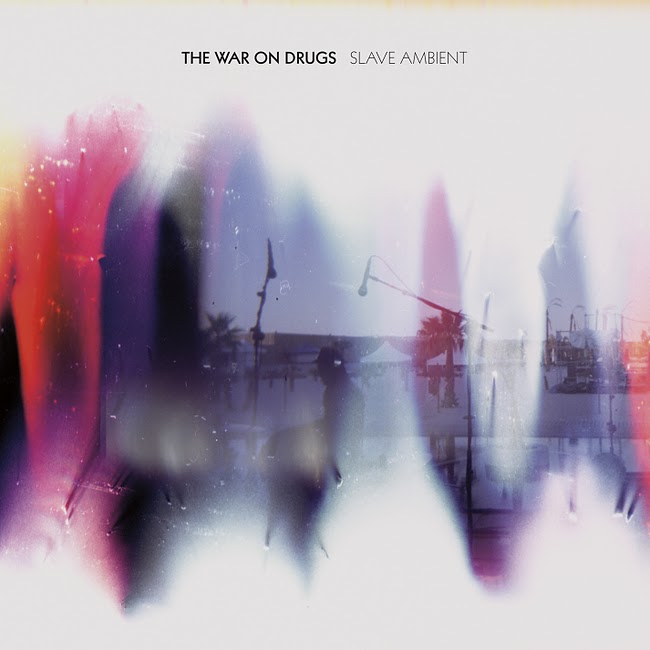
ADAM GRANDUCIEL: I had a few little bands in high school. We just played at my friend Jeff’s house. It wasn’t until I moved to Philly in 2003 that I was really interested in forming a band. I was doing some recording on my own and learning how to write songs, kinda getting into that. And then in 2005, [The War On Drugs] formed in a way.
PHAWKER: I know you moved to Philadelphia sort of on a whim in 2003. What were your initial feelings after moving here, and how have they changed over the years?
ADAM GRANDUCIEL: When I first moved there, I was into it. I was in the frame of mind that I was living in this new place without really knowing that many people. And then as I look back on it, it’s been such a great thing. I met everyone I play music with now as a result of me going there. I had a place where I could record and build a little studio, had friends that built studios… It’s a great place. I can’t imagine myself moving anywhere or living anywhere else. I’ve been in the same house for seven or eight years now.
PHAWKER: Upon moving to Philly, you met and began to play with Kurt Vile. Where did you guys meet, and how did you get started talking about music?
ADAM GRANDUCIEL: A couple months after moving here I met Kurt. He and my roommate at the time worked at the Yards brewery together. And he was like, hey, you should come see my friend Kurt. He’s playing tonight at The Fire. I was standing in the middle of the room and he was playing a Pavement cover, and I was like “this dude rules.”
PHAWKER: Yeah, a lot of people around here seem to start out at The Fire.
ADAM GRANDUCIEL: Yeah for sure. We played there a million times. And then he saw me — I was like one of three people there, totally digging it. And then he came over my house with my roommate a couple days later, and we started playing a lot of guitars, jamming on synthesizers, just kinda playing off each other.
PHAWKER: I know you tour a lot with Kurt’s band, The Violators. Do you ever find it difficult or overwhelming to balance the tour schedules of your band and his band, or has it just become a way of life?
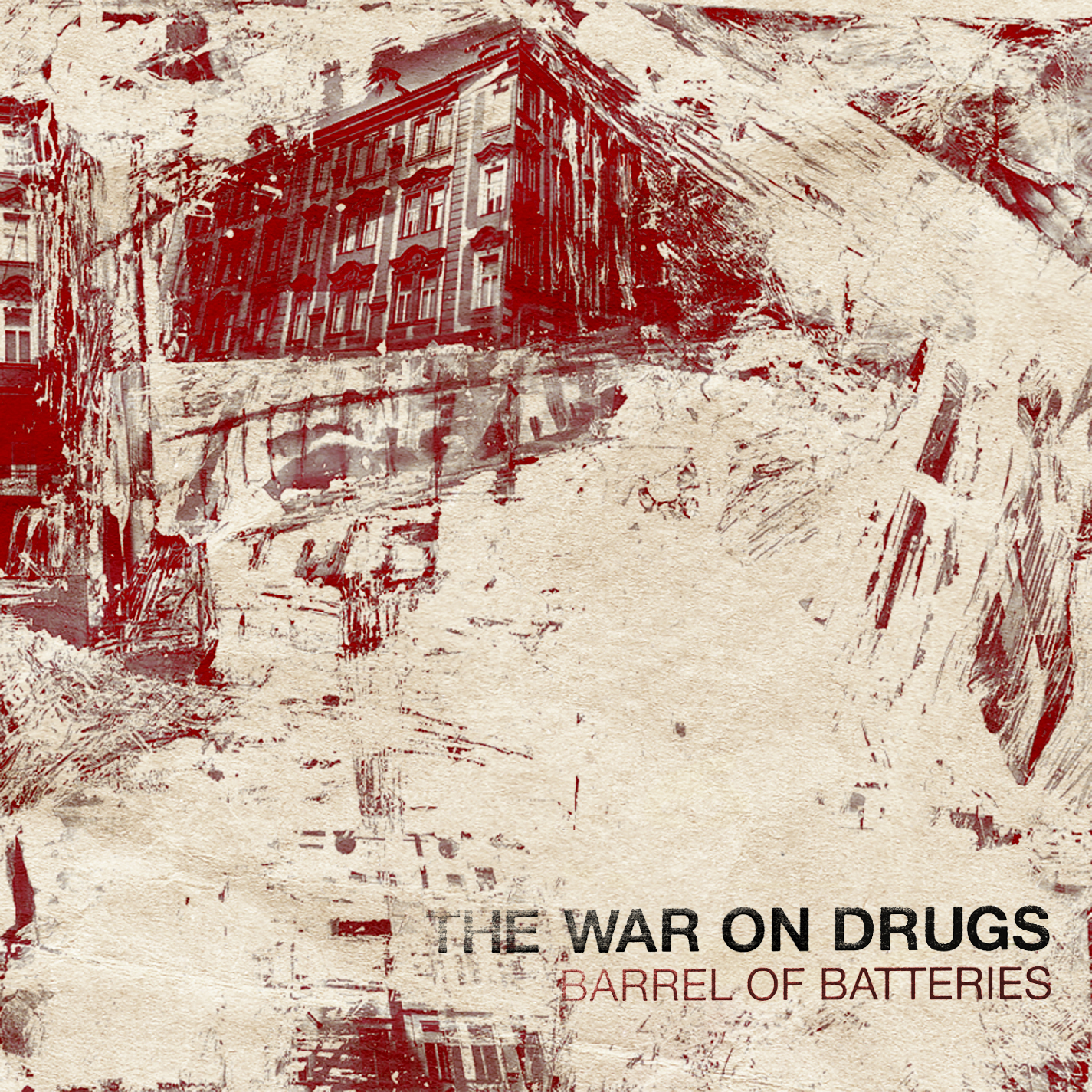 ADAM GRANDUCIEL: We don’t really have to balance the schedules. Obviously, I’ll do a Drugs tour first, but like this summer and the last couple months, without a new Drugs record, I haven’t had to tour too much. So to a point I play in The Violators. I’ve been in the band the longest, so it’s a big part of who I am as a musician and a guitar player. When The War On Drugs toured in April and May with Destroyer, I was on tour then so I missed that [Violators] tour, and when I tour in the fall for the Drugs, they’re going to be on tour then, so I’ll miss that as well. I like to think that I could do everything, but they all understand that I have my own thing as well. Maybe one day when we’re a little more established, we could arrange tours together, ya know? I mean, Kurt’s record is obviously awesome and has been received really well, so I kinda get up and tour as much as you can when the offer’s there. From my point of view, I wish I could do both all the time, but it’s kind of impossible.
ADAM GRANDUCIEL: We don’t really have to balance the schedules. Obviously, I’ll do a Drugs tour first, but like this summer and the last couple months, without a new Drugs record, I haven’t had to tour too much. So to a point I play in The Violators. I’ve been in the band the longest, so it’s a big part of who I am as a musician and a guitar player. When The War On Drugs toured in April and May with Destroyer, I was on tour then so I missed that [Violators] tour, and when I tour in the fall for the Drugs, they’re going to be on tour then, so I’ll miss that as well. I like to think that I could do everything, but they all understand that I have my own thing as well. Maybe one day when we’re a little more established, we could arrange tours together, ya know? I mean, Kurt’s record is obviously awesome and has been received really well, so I kinda get up and tour as much as you can when the offer’s there. From my point of view, I wish I could do both all the time, but it’s kind of impossible.
PHAWKER: So he pretty much stopped playing with you guys in 2008, then?
ADAM GRANDUCIEL: Yeah, I guess it was when the first record came out.
PHAWKER: How would you describe the evolution of your sound since he left?
ADAM GRANDUCIEL: I don’t know, they were always my songs, ya know? So I think that like anything, the songs he would play on definitely brought a certain theme to those songs, in the same way that any songs of his I play on. The evolution of the band is going where it would always go anyway, since I work on songs mildly obsessively. But I think that when two people play as much as Kurt and I did together, regardless if they were his songs or my songs, we’d just work on songs and experiment. That’s all we did for three years. Obviously it would’ve been a totally different thing if he was still in the band, but I don’t really think the sound really had to evolve. I think if anything it just gave me a little more freedom to do things the way I wanted to do them. But he never really truly “quit.” I just knew he’d be pursuing a new thing. It wasn’t like someone left the band and we were like, “what are we going to do now”? It took a little time to find a band that really worked really well together like we have now, which we formed on the Destroyer tour.
PHAWKER: So, while we’re on your new sound, let’s talk about your new album. I’ve listened to Slave Ambient in its entirety three times now, and not to do the whole drool-over-a-rockstar thing, but it really is an epic, cohesive album. How did you conceptualize the type of sound that you wanted to present for this album as compared to [the previous full-length Drugs album] Wagonwheel Blues?
ADAM GRANDUCIEL: Some of Wagonwheel was early-on recording at home, but it didn’t contain a huge amount of experimentation. Towards the end of Wagonwheel was when I started experimenting a lot more, like loops of sampling and resampling and all that… building up crazy sounds and tones. This newest record is a continuation of all the work I’ve done at home in the last couple years, like always tinkering with sounds and building up songs in nontraditional ways. Instead of sitting down and writing an acoustic song and just building on it, I started with really weird percussive loops that I built at home for weeks and months at a time, and then would write a song on top of certain atmospherics. Songs just take their own shape. There are like 20 versions of some of the songs on there, where they started and where they ended up. It’s like starting a song and then kind of re-imagining it, seeing where it can go. I saw every song through to the extreme, just changing things and tweaking it until it felt right and unique. I wanted it to be a really broad record in scope. It took a long time to arrive at a collection of songs that did it for me and also kind of tell a story.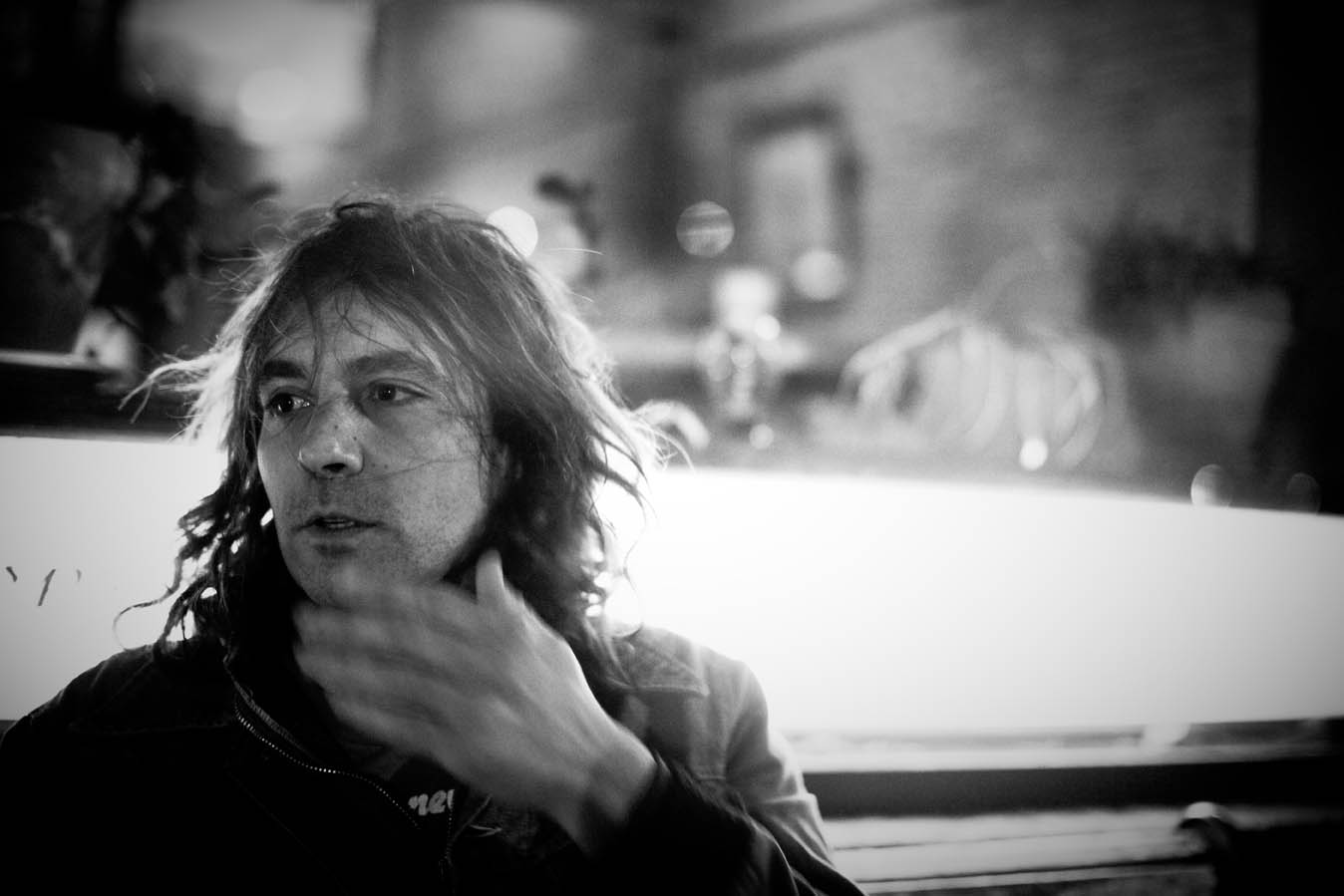
PHAWKER: It took about four years to record the whole thing, right?
ADAM GRANDUCIEL: Yeah, about four years on and off, in between tours. Just developing songs and arriving at versions that felt right. And all the little stuff in between that kinda ties some of the songs together or ties the melodies and themes together. And then compiling it.
PHAWKER: So would you say the mixing took the most work, or developing the songs?
ADAM GRANDUCIEL: A little bit of both, mixing and tracking the recording. I mean really, at the end of the day, we pre-mixed so many things, and then we would revisit it in a couple weeks and change things. We were totally immersed in the process. There was a period of two years that I listened to no other music but my own. It was a pretty intense process. I don’t know the extent of which I could do it again. It’s a once-in-a-lifetime record, in a way.
PHAWKER: Yeah, it sounds all-encompassing, but worth it, right?
ADAM GRANDUCIEL: Yeah, I’m super proud of it. It wasn’t a hard process because I was scrapping sessions or anything. It was a journey. It was a process of me honing my craft. I wasn’t in any rush to just put out another record. I wanted it to be special. It was a much more personal than Wagonwheel.
PHAWKER: Your lyrics have sort of a nomadic, troubadour-type feel to them, and the ambient sound on Slave Ambient seems to mirror that feeling. Have you always felt this feeling of rootlessness?
ADAM GRANDUCIEL: The way that I write my lyrics, it’s just kind of the way things come out. I’m not that restless… I’ve been in Philly for almost eight years now. It’s like the classic rock-and-roll mentality — seeing what’s out there, taking chances, and moving around. That kind of thing. But it’s not something I’m obsessed with.
PHAWKER: Like a rolling stone, huh?
ADAM GRANDUCIEL: Yeah, totally.
PHAWKER: So while we’re on the Dylan reference, I know you’ve spoken about his influence on your music, which you can definitely perceive through your lyrics and delivery. Who or what are your primary influences now as opposed to before?
ADAM GRANDUCIEL: I think it’s just kinda everything that you process over the years. I like the classic American songwriters. If you take the kind of music I’m making in 2011, it’s hard to not be familiar with Dylan or Petty or Springsteen. They’re like the touchstones of American rock music over the last 30 years. I’m really into Neil Young and these Yoko Ono boxed sets I have. At the end of the day, it’s that classic songwriting that i’m drawn to. Oh, and I’m not afraid to say I like Phil Collins.
PHAWKER: You recorded the album in a few different studios, but ended up scrapping a lot of the material and finishing up the record in Philly. Why do you think your recordings were more successful at home in your Philly studio?
ADAM GRANDUCIEL: Nothing was ever really scrapped… it was just a matter of every place I worked at, there was some stuff that I’d keep and some stuff that I’d remove. I worked on songs in a lot of different places, so I just kind of worked on the songs over time. It was kind of like a really extensive way of demoing my songs. All of my songs were started in my house, and then I worked on them in Dallas, I worked on them in North Carolina, and I finished them all in Philly. It was never like any sessions were scrapped or pointless. I just knew I was searching for certain performances of sound that I could only get by working on them for a year-and-a-half or two years a song. We worked on “Baby Missiles” for about three years. After all of those different songs, taking stuff out, adding more, taking stuff out, it kind of just became its own little thing. At the end of the day, a lot of stuff I do in the privacy of my own house with as much time as I want, that’s usually where all the songs were started and is where all the ambient textures come from. And then we kind of flushed it all out at Jeff Zeigler’s house, gave it all a home, and finished all the stuff. It was kind of a mix of my house and Jeff’s house that made the record what it is. All of the studios in between were cool, but it was just kind of ways to gather more material, me working on the songs. It was always just a constantly evolving thing. It’s definitely not the kind of record you could make in three weeks. Lots of trial and error, home recording, and hi-fi recording.
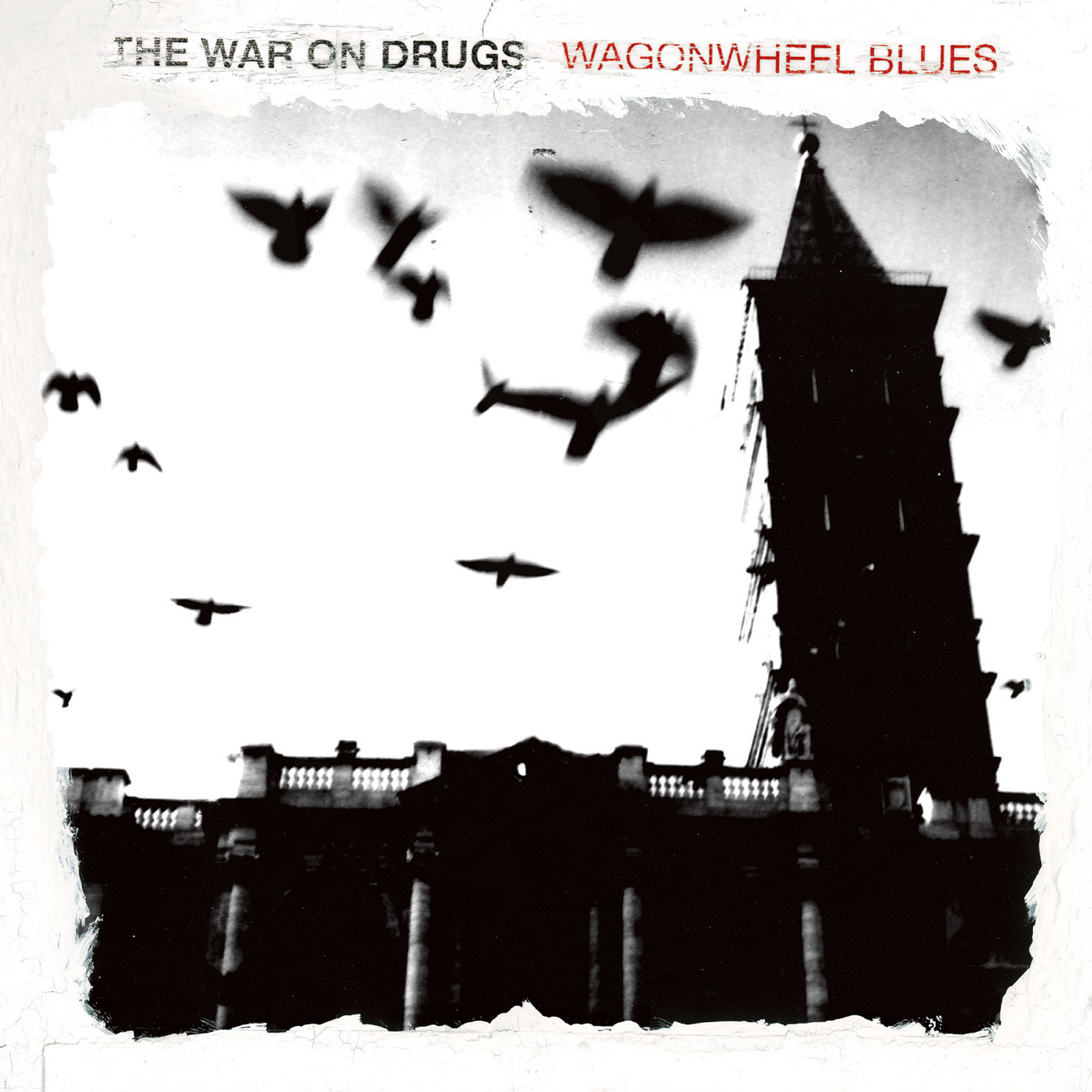 PHAWKER: So would you say most of the album was improvised or did you plan a lot of it out?
PHAWKER: So would you say most of the album was improvised or did you plan a lot of it out?
ADAM GRANDUCIEL: It wasn’t really improvised, maybe things were improvised but they weren’t checked. So if I was working on a song, like “Baby Missiles,” let’s say, which I worked on for three years, over the course of those three years, I would always add new vocals to them, changing the arrangement and getting the feel for the song. Maybe I’d be improvising the lyrics the whole time, and two years later I have like two years worth of improvised vocals that now I sing as if I wrote them down. A lot of the stuff, guitars or whatever, are all improvised in a way, but always with a greater thing in mind.
PHAWKER: Are you able to achieve the textured layers of the album’s songs when playing them live?
ADAM GRANDUCIEL: Maybe not perfectly or maybe not in the same way, but I think it’s more about recreating the general feel of the song than to recreate all the sound. I don’t want to go up there with a laptop of like fuckin’ 70 tracks, ya know? I’d rather focus on the band forming the core of the song, like the general way the song makes you feel. It’s a little different from the recording, but at the end of the day I think people will enjoy hearing the song. I do a lot of the ambient stuff live, too, with some samplers and guitar stuff. We’re not trying to exactly recreate it, but at the same time we’re not ignoring the fact that the ambient stuff and textures are a big part of the sound.
PHAWKER: I read an interview with you in which you state, “Who even buys records?” Actually, I am a pretty avid record-collector and even pre-ordered the Slave Ambient bundle package!
ADAM GRANDUCIEL: There’s a story behind that. So we were on tour for like five weeks, and we were driving through Montana, and I had this phone interview with this guy from Rock Island, Illinois or Rock Island, Iowa, a really small town, and he called and had no idea who we were. He had never listened to a song before. So I just fucked with him the whole time, but he created a whole article from it. We were driving through Montana, so I lost reception after like five minutes of it, and I just never called him back. I just figured he knew I was fucking with him. We played a show there two weeks later, which the piece was for. He wrote all that shit that I was fucking with him about, like not buying records. I’m a huge record collector. I mean, I was like, “Who even buys records anymore?” and he was like, “Yeah, good point, man, I don’t even know.” And I said, “Yeah, we should just give everything away for free”, and he was like “yeah man, definitely.” He didn’t even listen to one song. I was like, fuck this guy. And printing it all, I was like, you gotta be shitting me. Like I was oblivious to record sales or whatever. Even his editors, I guess they were oblivious too. They had no idea I was fucking with that dude.
PHAWKER: Well, I’ll make sure that’s printed that so they know.
ADAM GRANDUCIEL: Yeah, that’s the whole thing with most modern journalism. It’s so fuckin’ weak. No fact-checking or anything. People will just post it on another blog. Like with Kurt leaving the band, it’s such a better story than the bad fact-checking. We’ve done so much recording together, and then it just turns into one word, like he just quit the band to be a solo artist. It’s so cheap, ya know? There’s such a better story there than what lazy bloggers or lazy modern journalists tend to write about.
PHAWKER: It’s funny you say that, because I read the Wikipedia entry in my research, and it did seem like Kurt just up and quit the band, but then I read another interview with him, and he explained a totally different story.
ADAM GRANDUCIEL: Yeah, it’s not like you can control your own press. You just gotta let it slide and just kind of ignore it in a way. Yeah, so I just laid into that kid for a number of reasons. In a way I was honored that he printed it. And his editors, were they just as oblivious as him? They probably believed it. We’re all avid record buyers and fans of vinyl.
PHAWKER: And you’re putting out Slave Ambient on cassette, I heard?
ADAM GRANDUCIEL: Yeah, I can’t wait. And the record itself is a double-vinyl at 45 speed. So it’s like three songs a side, but it sounds super good. You can only have like 22 minutes on a side at 33 to make it sound good, and once you get over 21 or 22 minutes, you start to lose bass and clarity. “Your Love Is Calling My Name” and “The Animator” had to go together, so if that was all side A, it would have been 28 minutes and it wouldn’t have sounded good. So it had to be three songs a side so it wouldn’t fuck anything up. But it sounds awesome. It all came out super top-notch.
PHAWKER: You’re playing your only Philadelphia show this tour on August 18th at Johnny Brenda’s, which is, in my opinion, one of the city’s best venues. Do you have any sort of special affinity for that place in particular?
ADAM GRANDUCIEL: Yeah, we were the first band to ever play on that stage. When it opened in 2006, maybe, the first show there was a benefit for this kid Micah, and we got asked to play the benefit. Yeah, we were the first full band to ever play that stage. With both bands, I’ve played there probably 20 times. It’s in my neighborhood… it’s the heart and soul of the record.
THE WAR ON DRUGS PLAY JOHNNY BRENDAS THURSDAY NIGHT W/ CAVEMEN & TIN HORSES
The War on Drugs “Baby Missiles” from Secretly Jag on Vimeo.
